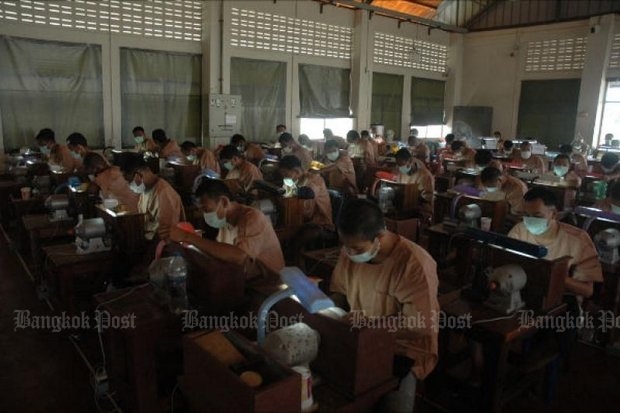
In a bid to rehabilitate incarcerated offenders and equip them with professional skills for their lives on the outside, prison work programmes have merely created a new industry behind bars that appears to exploit and enslave people.
Prisoners who have typically become exploited are those convicted of serious criminal offences, according to an investigative report by the Thai Civil Rights and Investigative Journalism (TCIJ). Those incarcerated for serious offences missed a chance to participate in training schemes provided for prisoners by the Corrections Department. They instead are made to work in suppressed conditions for a pay as low as 13 baht a day.
The Corrections Department has initiated work programmes that aim to provide essential professional skills to inmates while reducing recidivism and preparing them for a new life once freed.
It remains unclear whether these prisoners will be employable when they leave. What is clear is that many inmates have become a source of cheap labour in prison systems nationwide, generating roughly 8.5 million baht in revenues a year. Working conditions in prison are abysmal, with prisoners describing the work as slave labour, according to interviews of inmates by the TCIJ.
In 2015, there were 314,967 prisoners in 140 prisons throughout the country. Most prisons ran work programmes and generated associated income. The Ranong Central Prison earned the most at about 364,730 baht a year.
Every day, inmates work eight hours a day and take on overtime work as required. A female inmate revealed that the Corrections Department does not set specific rules on job classification for inmates. Corrections officials assign jobs to prisoners based on their convicted offences. Those who are incarcerated for serious offences such as murder are usually given the worst option -- a factory job.
Most prisoners are aware that being assigned to the "factory job" means they will have to work in slave-like conditions. About 100 prisoners work in a compound that looks like a factory. Packaging and packing are typical jobs, said the female inmate who is assigned to work under this category. For example, inmates spend long hours packing plastic forks and spoons that will be used to serve passengers during in-flight meals. The most labour-intensive and difficult job is the packaging of gold leaves used for gilding or decorating Buddha statues.
The quantity of work depends on the orders the department takes from companies. Each inmate will be given a quota to meet by a deadline set by a company. For gold leaf packing, each prisoner is usually told to complete 10 packs a day (each pack contains 500 gold sheets). If they fail to deliver, or miss the deadline, they will be subject to punishment such as being deprived of a meal or having their pay cut.
The woman inmate explained that employed prisoners get different levels of pay depending on their job. For example, those who work as supervisors get higher wages than lower-level workers, who are paid 400 baht a month, or 13 baht a day.
These supervisors usually force workers to take on more work because they are under pressure to compete with other prisons on their levels of productivity. Some prisoners allergic to gold leaf who fell sick have asked to be placed in different roles, only to have their request denied by corrections officials.
Other inmates say prison officers are mainly the ones who make jobs available to prisoners; the more jobs they can find, the greater their job prospects will be.
Due to exploitative work conditions and very low pay, many inmates prefer to bribe corrections officials or their supervisors for a chance to take on a non-factory or less-punishing job, such as stitching.
The Corrections Department has procurement regulations specifying which types of work is allowed to be taken by inmates to ensure security and prevent prison break attempts. It also sets requirements on minimum pay. However, these rules are rarely followed.
In reality, procurement has been handled through middlemen. A business operator said prison work programmes provide cheap labour and therefore business operators compete for contracts. He said he once bid for a procurement through a middleman who handled paperwork and dealt with all processes. In return, they charged more commission fees. Most businesses avoid dealing directly with corrections officials as it's likely that they will be asked to pay "tea money", or a bribe, and it's uncertain that they would get a contract.
Prison work programmes have been cited as a means to rehabilitate offenders and help them integrate into society once they are released. Under such unjustified and enslaved work conditions in the justice system, the Corrections Department faces a challenge of transforming prison ethics while making released prisoners employable.
Raviwan Rakthinkamnerd is a journalist at Thai Civil Rights and Investigative Journalism. This article originally appeared on the Prachatai news website.
